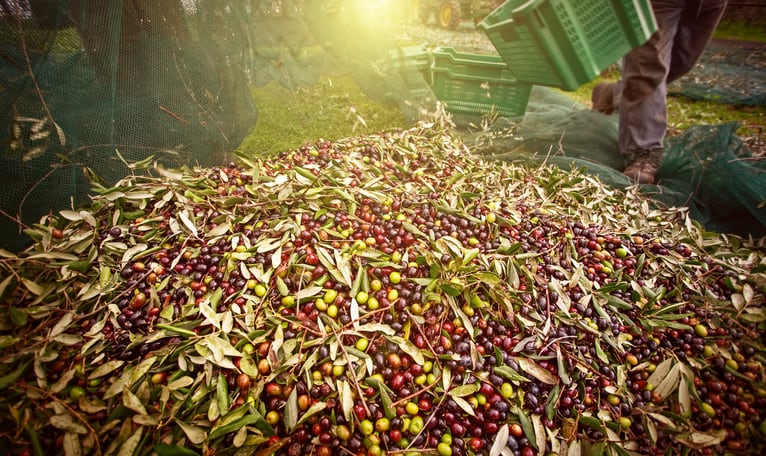GM crops could be a potential solution as severe heat in Europe threatens oil supplies, it has been suggested.
It comes as amid warnings the olive oil industry is in crisis amid extreme weather in Europe.
Earlier this week Kyle Holland, oilseeds and vegetable oils analyst at Mintec, said olive oil prices are seeing extreme increases of over 20% month-on-month and over 114% year-on-year as dry, hot weather impacts production in Spain, the world’s largest producer, as well as Italy.
Prices are in unchartered territory, and production is dropping to unheard of levels. “Market players are very worried where these prices will end,” he said.
The weather continues to have a significant impact on olive oil production across the globe, added Gary Lewis, KTC Edibles and NEODA. “The market simply cannot produce enough to meet demand, and as a result, prices will remain high for the foreseeable future until the end of 2024, at least,” he told FoodNavigator.
Drought last year, followed by a flood in spring and a heatwave in summer in key producing regions of Spain and Italy, have had a huge impact on available supply.
Last year, production was around 600,000 tonnes, down from 1.5 million in 2021, according to Lewis. Although global production is expected to increase in 2023, the world will still be in deficit for 2023/24. As a result, olive oil prices are at record highs – with prices more than doubling over the last year.

Vegetable oils also under pressure
Though the situation is pushing up demand for other oils such as sunflower and rapeseed, vegetable oil retail prices should, however, remain steady for the foreseeable future, Lewis told us.
To ensure consistency of supply and avoid market volatility, many retailers have taken advantage of lower wholesale costs and bought cover for the following year.
However, vegetable oils remain at the whim of both the weather and events in Ukraine.
The Ukraine war had a huge impact on oil prices last year – driving sunflower prices to record highs, and having a knock-on effect across the oil market, as demand for alternatives rose.
This has now stabilised, and prices of sunflower, rapeseed, soya, and palm oil are all sitting below pre-war levels, Lewis told us. Ukraine's own sunflower crop for 2023/24 is forecast at 12.4 million tonnes – up slightly from last year but still significantly down on the 17.5 million tonnes produced in 2021/22 (pre-war).
“The record prices of 2022 stimulated record planting across multiple oil crops, across the EU and around the world, and this additional supply has pushed prices down,” he revealed.
“Poland, Romania, Bulgaria, and Hungary have all banned Ukraine imports in an effort to protect their own markets. In addition, customers who switched from sunflower to other oil crops, such as rapeseed and palm, have been reluctant to switch back to sunflower – worried about developments in the Ukraine war.”
Rapeseed, meanwhile, is performing “exceptionally well” – with good availability and more competitive prices. This is because the Ukraine war stimulated extensive planting to provide an alternative to sunflower, and the EU looks set to deliver a record crop in 2023.
But there is still significant uncertainty in the market, and events in Ukraine could significantly impact future prices, Lewis warned. “The flooding caused by the destruction of the Kakhovka hydroelectric dam, the bombing of the key port of Odesa and the ending of the grain agreement with Russia don't just have a physical impact on the supply of oilseed, they have a psychological impact on markets and could push prices for sunflower and other oils up over the long term.”
Sunflower oil, for example, is priced slightly higher at the moment due to the uncertainties surrounding Ukraine, though lower demand from customers unwilling to switch back into sunflower for fears over supply is keeping costs lower.
The weather is also now having an impact on prices, Lewis told us. “Hot and dry weather in the US and Canada, the European summer heatwave and wet weather in the UK during July have pushed rapeseed prices higher.”
And although the outlook for the European rapeseed crop does look positive, with it still looking to be an above average crop, forecasts have been downgraded slightly due to the extreme heat and lack of rain.
How can we mitigate the impact of extreme weather? There are no silver bullets, said Lewis. “These are crops and are at the mercy of the weather. The commercial varieties we use are already very robust and designed to stand up to large fluctuations in temperature and weather.
"One part of the solution could be to turn towards GM solutions which they use extensively in the US. By genetically modifying crops, it's possible to make them more robust and increase yields.”

EU Deforestation Regulation may hit prices too
The biggest trend to watch out for is the upcoming EU Deforestation Regulation – and the impact this will inevitably have on palm oil markets.
The legislation will prohibit palm oil from being imported into the EU unless it is deforestation-free and produced in accordance with relevant legislation in the country of production, Lewis explained. “While this is a laudable goal, it will have significant consequences in the market in terms of price and availability,” he said. “In addition to consumers, retailers, and food manufacturers in Europe, it will impact the palm smallholders who make up 40% of global production.”
Currently, it seems fairly likely, according to the oils expert, that this legislation will completely exclude these smallholders from the EU market – and there seems to be no concrete mechanism or realistic support in place to include them. “These are poor family farmers in developing countries, and they may be unable to provide the necessary proof that their palm oil meets the relevant standards. Unless a solution is found to include these smallholders, they are likely to sell their palm elsewhere – to markets such as China.”
In Europe, the impact will likely be lower supplies and higher prices. “Alternative oils, such as sunflower and rapeseed, will need to fill that gap, which could put significant upwards pressure on vegetable oil prices across the board."




